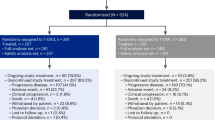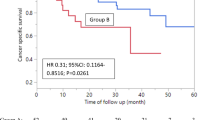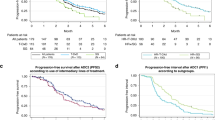Abstract
The proto-oncogene HER2 presents a novel therapeutic target. We report results in 25 patients with HER2+ advanced prostate cancer treated with the bispecific antibody MDX-H210 15 μg m–2by intravenous infusion plus GM-CSF 5 μg kg–1day–1by subcutaneous injection for 4 days repeated weekly for 6 weeks. Patients with stable disease or better received further cycles of treatment until disease progression or study withdrawal. 1 patient received no treatment and 4 received less than 1 cycle and are included in the toxicity analysis only. Median duration of follow up was 105+ (range 21–188) days. Toxicity was generally NCI-CTG 0–2. There were 2 grade 4 adverse events (heart failure and dyspnoea) and 1 grade 3 event (allergic reaction) resulting in discontinuation of the study medication. There were 9 further grade 3 events not resulting in trial withdrawal. There were no treatment-related deaths. 7/20 (35%) evaluable patients had a >50% PSA response of median duration 128 (range 71–184+) days. 7/12 (58%) patients with evaluable pain had improvements in pain scores. The PSA relative velocity on therapy decreased in 15/18 (83%) assessable patients compared to pre-study. GM-CSF and MDX-H210 is active in hormone refractory prostate carcinoma with acceptable toxicity; further studies are warranted. © 2001 Cancer Research Campaign http://www.bjcancer.com
Similar content being viewed by others
Article PDF
Change history
16 November 2011
This paper was modified 12 months after initial publication to switch to Creative Commons licence terms, as noted at publication
References
Cobleigh MA, Vogel CL, Tripathy D, Robert NJ, Scholl S, Fehrenbacher L, Paton V, Shak S, Lieberman G and Slamon D (1998) Efficacy and safety of Herceptin (humanized anti-her2 antibody) as a single agent in 222 women with her2 overexpression who relapsed following chemotherapy for metastatic breast cancer. Proc of ASCO 17: 97a
Connor RI, Shen L and Fanger MW (1990) Evaluation of the antibody-dependent cytotoxicity capabilities of individual human monocytes – role of Fc gamma R1 and Fc gamma R2 and the effects of cytokines at the single cell level. J Immunol 145: 1483–1489
Craft N, Shostak Y, Carey M and Sawyers CL (1999) A mechanism for hormone-independent prostate cancer through modulation of androgen receptor signaling by the HER-2/neu tyrosine kinase [see comments]. Nature Medicine 5: 280–285
Dawson NA (1998) Apples and oranges: building a consensus for standardized eligibility criteria and end points in prostate cancer clinical trials [see comments]. J Clin Oncol 16: 3398–3405
Fanger MW, Morganelli PM and Guyre PM (1992) Bispecific antibodies. Critical Rev Immun 12: 101–121
Fox SB, Persad RA, Coleman N, Day CA, Silcocks PB and Collins CC (1994) Prognostic value of c-erbB-2 and epidermal growth factor receptor in stag A1 (T1) prostatic adenocarcinoma. British Journal of Urology 74: 214–220
Guyre PM, Graziano RF, Vance BA, Morganelli PM and Fanger MW (1989) Monoclonal antibodies that bind to distinct epitopes on Fc gamma RI are able to trigger receptor function. J Immun 143: 1650–1655
James N, Atherton P, Koletsky A, Tchekmedyian N and Curnow R (1998a) Phase II trial of the bispecific antibody MDX-H210 (anti-HER2/neu x anti-CD64) combined with GM-CSF in patients with advanced prostate and renal cell carcinomas that express HER2/neu. B J C 78: 56
James N, Atherton P, Koletsky A, Tchekmedyian N and Curnow R (1998b) Phase II antibody trial of the bispecific antibody MDX-H210 (anti-HER2/neu x anti-CD64) combined with GM-CSF in patients with advanced prostate and renal cell carcinomas that express HER2/neu. ProcASCO 17,
Kallakury BVS, Sheehan C, Ambros RA, Fisher HA, Kaufman, Jr, RP Muraca PJ and Ross JS (1998) Correlation of p34cdc2 Cyclin-Dependent Kinase Overexpression, CD44s Downregulation, and HER-2/neu in Prostatic Adenocarcinomas. J Clin Oncol 16: 1302–1309
Kaplan EL and Meier P (1958) Non-parametric estimation from incomplete observations. J Amer Stat Assoc 53: 457
Kushner BH and Cheung NK (1989) GM-CSF enhances 3F8 monoclonal antibody-dependent cellular cytotoxicity against melanoma and neuroblastoma. Blood 73: 1936–1941
Lyne JC, Melhem MF, Finley MDGG, Wen D, Liu PhDN, Deng BSDH and Salup R (1997) Tissue Expression of Neu Differentiation Factor/Heregulin and Its Receptor Complex in Prostate Cancer and Its Biologic Effects on Prostate Cancer Cells in vitro. Cancer J Scientific Amer 3: 21–30
McLaughlin P, Grillo-Lopez AJ, Link BK, Levy R, Czuczman MS, Williams ME, Heyman MR, Bence-Bruckler I, White CA, Cabanillas F, Jain V, Ho AD, Lister J, Wey K, Shen D and Dallaire BK (1998) Rituximab chimeric anti-CD20 monoclonal antibody therapy for relapsed indolent lymphoma: half of patients respond to a four-dose treatment program. J Clin Oncol 16: 2825–2833
Metcalf D (1986) The biology and function of the granulocyte macrophage colony stimulating factors. Blood 67: 257–267
Morote J, de TI, Caceres C, Vallejo C, Schwartz SJ and Reventos J (1999) Prognostic value of immunohistochemical expression of the c-erbB-2 oncoprotein in metastasic prostate cancer. Inter J Cancer 84: 421–425
Peto R, Pike MC, Armitage P, Breslow NE, Cox DR, Howard SV, Mantel N, McPherson K, Peto J and Smith PG (1977) Design and analysis of randomized clinical trials requiring prolonged observation of each patient. II. analysis and examples. B J C 35: 1–39
Posey JA, Raspet R, Verma U, Deo YM, Keller T, Marshall JL, Hodgson J, Mazumder A and Hawkins MJ (1999) A pilot trial of GM-CSF and MDX-H210 in patients with erbB-2-positive advanced malignancies. J Immuno 22: 371–379
Ross JS, Nazeer T, Church K, Amato C, Figge H, Rifkin MD and Fisher HAG (1993) Contribution of HER-2/neu oncogene expression to tumor grade and DNA content analysis in the prediction of prostatic carcinoma metastasis. Cancer 72: 3020–3028
Ross JS, Sheehan BC, Hayner-Buchan MAM, Ambros MRA, Kallakury MBVS, Kaufman MR, Fisher MHAG, Rifkin MMD and Muraca BPJ (1997a) Prognostic significance of HER-2/neu gene amplication status by fluorescence in situ hybridization of prostate carcinoma. Ameri Cancer Soc, 2162–2170
Ross JS, Sheehan C, Hayner-Buchan AM, Ambros RA, Kallakury BVS, Kaufman R, Fisher HAG and Muraca PJ (1997b) HER-2/neu Gene Application status in prostate cancer by fluorescence in situ hybridization. Human Pathology 28: 827–833
Sadasivan R, Morgan R, Jennings S, Austenfeld M, Van Veldhuizen PV, Stephens R and Noble M (1993) Overexpression of HER-2/neu may be an indicator of poor Prognosis in prostate cancer. J Urol 150: 126–131
Simons JW, Carducci MA, Weber CE, De Marzo A, Baccala A, Cohen L, Clift SM, Mikhak B, Piantadosi S, Partin AW, Carter HB and Levitsky HI (1998) Bioactivity of autologous irradiated prostate cancer vaccines generated byex vivogm-csf gene transfer. Proc ASCO 17: 1205
Slamon D, Leyland-Jones B, Shak S, Paton V, Bajamonde A, Fleming T, Eiermann W, Wolter J, Baselga J and Norton L (1998) Addition of HerceptinÖ (humanized anti-her2 antibody) to first line chemotherapy for her2 overexpressing metastatic breast cancer (her2+/mbc) markedly increases anticancer activity: a randomized, multinational controlled phase III trial. Proc ASCO 17: 98a
Slovin SF, Scher HI, Divgi CR, Reuter V, Sgouros G, Moore M, Weingard Pettengall R, Imbriaco M, El-Shirbiny A, Finn R, Bronstein J, Brett Milenic D, Dnistrian A, Shapiro L, Schlom J and Larson SM (1998) Interferon-gamma and monoclonal antibody 1311-labeled CC49: Outcomes in patients with androgen-independent prostate cancer. Clin Cancer Res 4: 643–651
Small EJ, Reese DM, Um B, Whisenant S, Dixon SC and Figg WD (1999) Therapy of advanced prostate cancer with granulocyte macrophage colony-stimulating factor. Clin Cancer Res 5: 1738–1744
Smith DC, Dunn RL, Strawderman MS and Pienta KJ (1998) Change in serum prostate-specific antigen as a marker of response to cytotoxic therapy for hormone-refractory prostate cancer. J Clin Oncol 16: 1835–1843
Vollmer RT, Dawson NA and Vogelzang NJ (1998) The dynamics of prostate specific antigen in hormone refractory prostate carcinoma. Cancer 83: 1989–1994
Yeh S, Lin HK, Kang HY, Thin TH, Lin MF and Chang C (1999) From HER2/Neu signal cascade to androgen receptor and its coactivators: a novel pathway by induction of androgen target genes through MAP kinase in prostate cancer cells. Proc Nat Acad Sci USA 96: 5458–5463
Author information
Authors and Affiliations
Rights and permissions
From twelve months after its original publication, this work is licensed under the Creative Commons Attribution-NonCommercial-Share Alike 3.0 Unported License. To view a copy of this license, visit http://creativecommons.org/licenses/by-nc-sa/3.0/
About this article
Cite this article
James, N., Atherton, P., Jones, J. et al. A phase II study of the bispecific antibody MDX-H210 (anti-HER2 × CD64) with GM-CSF in HER2+ advanced prostate cancer. Br J Cancer 85, 152–156 (2001). https://doi.org/10.1054/bjoc.2001.1878
Received:
Revised:
Accepted:
Published:
Issue date:
DOI: https://doi.org/10.1054/bjoc.2001.1878
Keywords
This article is cited by
-
Sintilimab, stereotactic body radiotherapy and granulocyte–macrophage colony stimulating factor as second-line therapy for advanced non-small cell lung cancer: safety run-in results of a multicenter, single-arm, phase II trial
Radiation Oncology (2021)
-
Induction of anti-tumor immunity by trifunctional antibodies in patients with peritoneal carcinomatosis
Journal of Experimental & Clinical Cancer Research (2009)
-
Combining gene and immunotherapy for prostate cancer
Prostate Cancer and Prostatic Diseases (2008)



